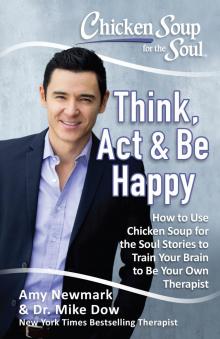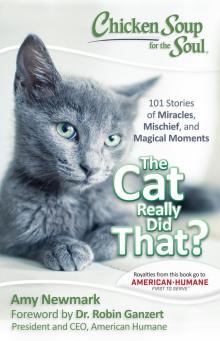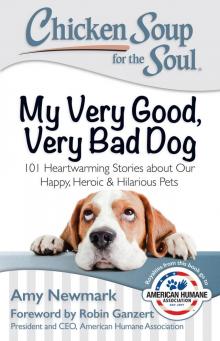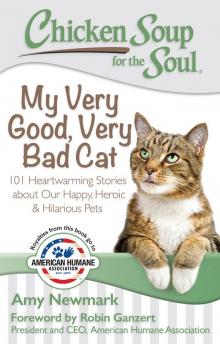- Home
- Amy Newmark
Hope & Miracles Page 2
Hope & Miracles Read online
Page 2
Once in a while, the twenty-two-year-old was given top-secret assignments. Like the time he was instructed to fetch a list of grocery items and hand-deliver them to McGovern’s hotel. The list included a bottle of Jack Daniel’s, Hershey bars, and an orange (the senator had a cold, he was told, off the record).
On the night of October 29th, the staffers worked especially late. With Marvin Gaye and The Temptations playing in the background, they stuffed envelopes until their fingers ached and it was well past midnight. Jamie got back to his apartment, set his alarm for 6:30 a.m. so he could catch the 7:20 a.m. train, and passed out. Every morning he took the same train on the Illinois Central commuter line. He picked it up at 53rd Street and rode it along Lake Michigan past Soldier Field football stadium.
That morning, Jamie’s alarm clock didn’t go off. He overslept until 8 a.m., then rushed to get ready . . . turning on his clock radio to the all-news AM station WBBM as he got dressed. That’s when he heard:
“. . . .breaking news . . .in what may be the worst train wreck in Illinois history, one commuter train rear-ended another at approximately 7:40 a.m. this morning near the 27th Street platform, killing dozens and injuring hundreds of passengers . . .”
It was Jamie’s train. The final death tally was forty-five with over 300 injured. The crash occurred two stops and twenty minutes away from Jamie’s apartment.
Amy: And now let’s advance the calendar again, to the afternoon of December 21, 1988, when the phone rang and I learned that my father’s flight home from London, Pan Am flight 103, had mysteriously crashed in Lockerbie, Scotland, only thirty-eight minutes after taking off from London’s Heathrow Airport.
My father worked in London part-time and was flying home that day to join the family for Christmas. With one phone call, everything changed for us. Of course, we were filled with dread, but it all seemed so unbelievable that I rushed to reassure my mother and grandmother, who were panic-stricken, that we really didn’t know anything yet.
Our only hope was that my father was somehow not on the flight. Remember back then, when you could miss your flight and use your ticket on a later flight or even on another airline?
But if my father had missed the flight, why hadn’t he called us to tell us that he was okay? After all, it was already nighttime in London.
We left messages on the answering machine at my father’s house for hours but there was still no word. We grew increasingly worried, but I held onto a little hope. After all, we were the family that was always late!
Finally, when it was very late in London, my father called us to report that he had missed the flight and gone out to dinner, with no idea that his flight had crashed and that his horrified family was waiting for news back in New York. Dad had finally noticed the blinking light on his answering machine and listened to our increasingly frantic messages. He was very shook up when he learned that all 259 people on his flight were killed, along with eleven people on the ground. He came home a couple of days later and we had quite a meaningful Christmas that year. We were all counting our blessings, and I have valued every day with my father since then.
We were relieved to learn as well that Pan Am 103 was not full, meaning that some other poor soul didn’t take my father’s place on standby. Dad’s seat remained empty, so humanity was up one that night!
Natasha: Good thing we’re both from a family that’s always late. As we’ve said, lateness can be divine. A little more than a decade after your father’s missed flight, my former roommate, Alessandra, was pacing back and forth in her Upper East Side loft in Manhattan.
The babysitter was supposed to arrive at 8 a.m. to look after Ale’s eight-month-old son, but she was twenty minutes late and Ale was anxious. She was the CEO of the family-owned shipping company and because they had offices all around the world, it was crucial she be downtown at her desk every day by 8:30 a.m. to field incoming calls from various time zones.
When the apologetic sitter arrived, Ale raced down five flights in her high heels and ran to catch the express subway going south. Her office on the 46th floor at One World Trade Center had magnificent views of the Statue of Liberty and the Hudson River.
She got off the subway just before 9 a.m., stepped onto the platform, and smelled smoke. Without any hesitation, Alessandra immediately crossed the platform and got on the train going north, back home to her baby. She had no idea that the first plane had hit her office tower less than ten minutes earlier. But she’d smelled smoke here before—in ’93 when terrorists planted a bomb that detonated. So when she smelled smoke, she smelled trouble. She got out of there on one of the last subway trains running. A few minutes later, the second plane hit.
A sinking ship, a train wreck, and two acts of terrorism—all narrowly missed. You can call it coincidence, luck, or fate. We prefer to think the odds are with us that we each get one fabulously epic and divine intervention in our lifetime that saves us.
We plan to be fashionably late for ours.
~Natasha Stoynoff and Amy Newmark
Messages from Heaven
Jesse in the Sky
When love is lost, do not bow your head in sadness; instead keep your head up high and gaze into heaven for that is where your broken heart has been sent to heal.
~Author Unknown
Since the day my six-year-old son Jesse was killed, I’ve prayed a million prayers. I’ve prayed that there is a heaven and that Jesse is there playing with his favorite rubber ducks. I’ve prayed that his brother, J.T., and I would survive our broken hearts and smile again. And I’ve prayed, over and over, that the world become a less violent, more loving place.
Jesse was murdered on December 14, 2012, when a young man shot his way into Sandy Hook Elementary school in Newtown, Connecticut, and opened fire—killing six adults and twenty children, Jesse included.
My little boy was a hero in his final moments. When the gunman’s rifle jammed for a few seconds as he stood in the first grade classroom, my sweet Jesse yelled to his classmates hiding in the bathroom across the room: “Run! Run now!”
His last words saved their lives, but he couldn’t save his own. The young man with the rifle was blocking Jesse’s escape path and a moment later, he shot my boy in the head as my son faced him.
Jesse’s act of bravery doesn’t surprise me a bit.
Every night in his bubble bath, he would surround himself with superhero ducks and his collection of toy soldiers — “my army men,” he’d call them—lining them up along the porcelain tub’s edge. On Saturday afternoons, he’d go “on patrol” at our farm. First, he’d get in uniform: his green army helmet and camouflage-patterned snow boots. Then, he’d stick his water pistol in his waistband and go stand guard by our front gate, pacing back and forth, ready to squirt harmful intruders who dared approach.
He wanted to keep us safe and happy. That’s the part of Jesse that called out to his classmates to run, and it’s the part that answered my prayer one day when I was on my knees in grief.
Some people say we can receive “signs” from our loved ones who are on the “Other Side” after they’ve passed—and I believe it.
Since Jesse’s been gone, J.T. and I and the rest of the family have been comforted by dozens of little “signs” from him—flickering lights when we call out his name or notes we’ve found in Jesse’s handwriting when we’re desperate to hear his voice. Some may think these signs are coincidental, but we feel they are much more than that. To us, it’s Jesse saying hello and letting us know he’s watching over us. They are little, intimate moments that we recognize—we don’t need big billboards in the sky to let us know he’s there.
But one day, that’s exactly what we got.
About two weeks after the shooting, J.T. and I had to get away. The grief in our town was so all-consuming that we were drowning in it. We boarded a flight to Orlando in hopes that a few days in the warmth would help us begin the healing process, if that was even possible.
On the flight south, we had more signs
from Jesse. When I tried to listen to different genres in the in-flight music selection, the songs kept skipping to a favorite of Jesse’s — and then, one for his mama who was a teen in the Eighties—Rick Springfield’s “Jessie’s Girl.” I sat back in my seat with a big smile, ecstatic to hear from my boy and, as always, hungry for more signs that showed he was with me.
Arriving at the Orlando airport, I checked my iPhone. I’d sent a text hours earlier to a psychic I’d recently met, detailing the signs I’d been getting from Jesse and asking for her input.
Her response devastated me: Maybe Jesse is lingering here and not moving onward because he wants to make sure you and J.T. are okay. Spirits do that sometimes.
I didn’t want J.T. to see my distress, so I told him, “Wait for me at the car rental, I’ll be right back.” I raced to the ladies room, locked myself in a stall, and burst into the most gut-wrenching tears I’d cried so far—and that’s saying a lot. I was horrified that I’d lost my boy, and in such a tragic way. Now was I keeping his spirit from moving onward due to my own selfishness? Was Jesse hanging around in some kind of limbo just to give his mother the signs I had come to depend on?
I cried even harder at this possibility, and I knew what I had to do. Jesse had been unselfish and brave in his final moments, and I had to be that now, too.
“Jesse, you’ve been so precious,” I said aloud, “to send us such sweet messages to comfort us and let us know you’re okay. But you have to listen to your mama now. We are going to be okay —J.T. and I. You can go to Jesus now, do you hear me, sweet boy? Go to Jesus, we will be okay. Always know how much I love you.”
I dried my tears and returned to J.T., giving him a big hug.
“Everything’s going to be all right now,” I told him, and we hopped into the rental car and sped off down the highway. We’d only been driving for a few minutes when I saw it.
High up against the open blue sky, a small plane was soaring across. It had just spelled out something in smoke:
JESSE & JESUS. TOGETHER FOREVER.
Except the “J” in “Jesse” was backwards — the same way Jesse used to write his name.
Was I imagining this? I looked over at J.T. and saw him looking up. Did he see it, too?
“Mom, look!” J.T. yelled, excited. “Jesse’s with Jesus!”
We pulled over to the side of the road and sat in awe and silence, staring at the sky. Then J.T. quickly took some photos of the message as it began to dissipate.
We were stunned. What a miraculous affirmation, I thought. I had no doubt that Jesse heard my tearful plea in the bathroom stall, and was telling his mama not to worry, that he was fine and indeed, in the arms of Jesus.
Jesse! Thank you, thank you, thank you! And thank you, Jesus . . . please take good care of my sweet boy!
I had no idea who the skywriting pilot was and I never attempted to find out. To me, it would be no less of a miracle if I solved that mystery. Only a handful of people knew where we were flying that day, and our departure time had changed three times due to bad weather, so how could anyone have timed a skywriting message to appear at the exact moment we were driving down the highway?
Nearly two years after we got our message in the sky, a friend read an article in the Miami Herald about two Christian pilots in Florida who started a “sky ministry” and used their bright-yellow crop duster, dubbed “Holy Smoke,” to write inspirational messages to people at 10,000 feet. On a clear day, you could see their Jesus writings from thirty-five miles away.
“God is the one strategically putting those messages there,” one of the pilots was quoted as saying, “we’re nothing more than the pen. These are God’s love letters to his children.”
I have yet to call and confirm if the Holy Smoke pilots were the ones who wrote my Jesse message, but I will someday.
Until then, I consider whoever was up in the Orlando sky that day a messenger from heaven and Jesse. He was God’s helper, answering my prayer when I needed it the most.
~Scarlett Lewis with Natasha Stoynoff
Embracing a Second Chance
The most important thing in illness is never to lose heart.
~Nikolai Lenin
It was the end of July and Orlando was hot and humid. We sighed with relief as we settled into the air-conditioned three-bedroom rental. Lorenza and I claimed the master suite, his mother and sister, Michele, unpacked in their adjoining studio, and our young son asked, “Is it time to eat?” He grabbed his favorite toy and disappeared into the bedroom he would share with my mom.
Summer heat didn’t bother Christopher. He was elated to be on vacation with his aunt and both grandmothers. Summer break would soon end, but entering the sixth grade was the least of his concerns. We were close to the theme parks, so all he could think of was a fun-packed week.
While my husband returned the luggage cart to the lobby, Michele and my mother-in-law studied a pile of slick travel brochures. Mom joined me in the kitchen to prepare dinner and we talked about our itinerary. We would spend two days at Disney’s Animal Kingdom, shop for souvenirs, and attend a dinner theater. The rest of our time would be spent leisurely relaxing around our resort.
That night, everything changed. Everybody else slept as I tried to doze off, but that wasn’t an easy task. It had been two years since I was diagnosed with aortic stenosis. Up to then, I was unaware that I had a congenital heart defect. My cardiologist forecasted two more years until open-heart surgery, but lately I had noticed a discernible change in my condition. I propped myself up on a mountain of pillows to breathe easier, but I could still hear congestion in my lungs. How would I navigate the amusement park without collapsing? I moved to a wide bedside chair, elevated my feet on the ottoman, and leaned back against a pillow, thinking I’d rent a scooter.
The next morning, I knew I couldn’t go with my family. My feet were swollen, I felt breathless, and I was spitting up blood. “I’m staying here,” I told them, refusing to ruin their day with the details of my night.
“No, Momma!” my son said with disappointment. “I want you to come!”
I squeezed his arm gently. “I need a nap, son . . . maybe another day.”
“Are you sure? We can go tomorrow.” My husband studied me, concern evident in his eyes.
My ever-vigilant mother was determined to take care of me. “I’ll stay with her. Take Chris to the park and have fun.”
I gave my husband a kiss, then my son. “Don’t worry. I’ll rest today, and we’ll go to dinner tonight.”
I hid my tears until they walked out the door. I was discouraged about giving up time with my family, but I was even more distressed about what I had discovered by surfing the Internet on our laptop. I was experiencing the warning signs of congestive heart failure.
When we returned home, I made an appointment with my cardiologist. Lorenza sat beside me in the examining room, holding my hand. I had told him my suspicions, but I hoped I was wrong. I still had not resigned myself to the prognosis because I’d felt pretty normal until recent months. The symptoms had manifested slowly and I’d adjusted my life accordingly. Except for driving my son to and from school, I stayed home most days and I had gradually curtailed my normal routine.
Following an echocardiogram, Dr. Moore joined us. “The valve has narrowed so much that it’s severely obstructing blood flow. I’m referring you to a surgeon.”
“When will that be?” Lorenza asked.
“As soon as possible.”
I cried.
The doctor gave me a consoling hug. “You’ll feel better after surgery.”
I should have been hopeful but I felt fearful and anxious instead. I was frightened that I would die. That possibility sent my mind reeling. Even though I knew I had no choice, and that I certainly wouldn’t survive without a new heart valve, my anxiety got the best of me. I remembered what I’d been through years earlier when I had gallbladder surgery. Would surgery be painful? They’d have to stop my heart! How could this be happening to me? My fath
er had died from cardiac arrest when he was fifty. Would I die young too?
We discussed all the possibilities with Christopher because it was unfair not to tell him what everybody else knew. “Daddy and I need your help now,” I told him. It’s amazing how little kids will step up when necessary. He assisted his dad with household chores without complaint. Lorenza did all the cooking. They were always loving and tender, and I needed their comforting words more than ever as I fought depression. My mother had moved to Florida the year before to be closer to my little family. While I knew she wanted to be by my side through this turmoil, I also realized she had come to help take care of our son while I was sick . . . and in case I didn’t make it through surgery.
I wanted Chris to remember our time together fondly. We went to movies, we packed picnic lunches, and one day we drove to St. Augustine Beach where Lorenza parked on the hard sand so I could watch my guys swim in the ocean.
We went to my mother’s house one Sunday for dinner. By then, I was overwhelmed. No matter what my husband and mother said to calm my nerves, it was never enough. I prayed fervently, asking God to take all of it away from me. I wanted a miracle.
I went out on the porch and immersed myself in that peaceful moment as a bald eagle swooped over the marsh. It was high tide, my favorite time of day. “Help me, God. Tell me what to do.”
I was surprised by what I heard but I recognized the message immediately. “I never had a chance. You do.” My dad had died more than thirty years before, when heart procedures weren’t so advanced. At that moment, I realized I had been selfish—so self-absorbed that I hadn’t acknowledged that a mechanical valve was a gift. I had an opportunity to live a longer, more fulfilling life.
I walked back into the house and announced, “I am ready for heart surgery.”
Mom and Lorenza were astonished. I smiled, knowing they were puzzled yet relieved.

 Chicken Soup for the Soul
Chicken Soup for the Soul The Joy of Less
The Joy of Less Hope & Miracles
Hope & Miracles The Cat Really Did That?: 101 Stories of Miracles, Mischief and Magical Moments
The Cat Really Did That?: 101 Stories of Miracles, Mischief and Magical Moments The Joy of Christmas
The Joy of Christmas My Very Good, Very Bad Dog
My Very Good, Very Bad Dog My Very Good, Very Bad Cat
My Very Good, Very Bad Cat